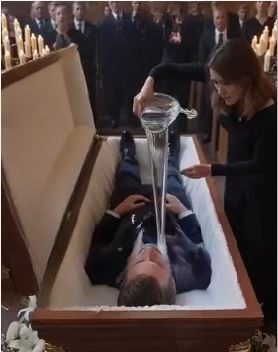From Betrayal to Bravery: How Claire Dawson Turned Deception into Strength

Quiet nights have a way of magnifying every doubt, every fear. For those who have carried families, budgets, and dreams through decades of hard work, the unexpected often lands like a physical blow. This is the story of Claire Dawson—a woman who faced marriage betrayal, financial deception, and a carefully orchestrated disappearance. Her response was not panic. It was strategy.
It’s a story that offers lessons in vigilance, personal finance, and resilience. Most of all, it is a reminder that clarity and calm can be stronger than shock and spectacle.
The Call That Changed Everything
By 2 a.m., Claire had already brewed a cup of tea, sipped it absentmindedly, and forgotten it in the quiet kitchen. Her husband, Michael, had promised he’d return home by 7 p.m. after a late meeting. Midnight came and went. The phone finally rang—it was the state police. Michael’s car had been found wrecked near a riverbank off I-95 in Connecticut. No body. “Most likely gone,” the officer said.
Two small words that hit like boulders. Claire sank into a mix of shock and disbelief, feeling the weight of loss settle over her like a winter blanket.
The Night of Waiting: Grief and Suspicion
Neighbors arrived with casseroles. Friends hovered with sympathetic smiles. The house became a shrine to unanswered questions. Claire answered calls she couldn’t remember making, stared at the television she hadn’t turned on, and tried to face insurance forms and funeral logistics that felt impossible to manage.
Yet grief has a strange way of sharpening the mind. In the silence, Claire noticed details that did not align. The inconsistencies were subtle—whispers rather than shouts—but they planted seeds of doubt.
The First Clues: When the Truth Whispers
It started with a motel receipt, signed in Michael’s handwriting, dated the day after the supposed accident. At first, Claire considered it a clerical error. But small ATM withdrawals across multiple states and a neighbor’s sighting of Michael’s car near a rest stop painted a different picture.
Anger replaced despair—not as a rush, but as a quiet, methodical decision to investigate. Claire’s first instinct was not confrontation but organization. She created a binder, cataloged every document, cross-referenced bank statements, and noticed a payment to a storage unit in Baltimore under the name “Mark Dillon.”
The scent of dust and motor oil greeted her when she opened the unit. Boxes of cash, prepaid phones, and false IDs were lined neatly, like evidence waiting for discovery. This was no accident; it was a carefully planned exit.
Choosing Strategy Over Panic
Instead of immediately contacting insurers or law enforcement, Claire sought guidance from Tom Reeves, a retired detective who had once helped her late father with a neighborhood case. She calmly explained her suspicions. Two weeks later, Tom confirmed: Michael was alive, using an alias at a marina in Charleston.
Claire did not announce her plans. There were no social media posts, no dramatized calls to friends. She booked a flight quietly, with a carry-on and a plan.
Face-to-Face: Confronting a Borrowed Life
At the marina, the sun glinted off the water as Claire spotted Michael—fit, tanned, moving through the crowd as if nothing had happened. That evening, she confronted him in a small apartment:
“You staged a disappearance and expected me to cash out the life we built to fund your new one,” she said calmly, laying evidence across the table: the storage unit lease, cash bundles, IDs, and a motel receipt.
Michael stammered excuses about debts and danger. Claire’s response was measured and decisive:
“You fled. We’re done playing pretend.”
The Morning After: Legal Consequences
Authorities acted swiftly. The evidence Claire collected ensured Michael’s deception became a matter of law. Fraud, false identities, and a staged disappearance carried tangible consequences. Claire felt relief rather than triumph. She had not sought revenge—she had sought clarity.
Her approach was precise: legal counsel, document review, and careful account management. There were no viral videos, no sensationalized headlines, only the quiet satisfaction of protecting herself and her assets.
Reclaiming the Narrative
With the immediate crisis behind her, Claire channeled her experience into something constructive. She organized a community event for women, offering guidance on financial vigilance and recognizing warning signs. She taught practical skills:
Keeping digital and paper copies of essential documents.
Monitoring account activity regularly.
Recording suspicious events with dates.
Seeking trustworthy advisors for guidance.
Confirming facts before acting on assumptions.
The sessions resonated. Women of all ages left feeling empowered, aware that self-protection and clarity are strengths, not burdens.
Ordinary Strength: Beyond Headlines
Claire’s victory was not found in arrests or news coverage. It was in daily routines and regained control: morning walks, ledger keeping, reconnecting with friends, and hosting educational sessions. She transformed her binder into a curriculum: clear, practical, and empowering.
Local media captured this quieter triumph, highlighting her work with women in a community setting—no sensationalism, just education, support, and camaraderie.
The Inner Conversation
Claire also faced herself. She wrote a letter to open a year later, acknowledging her trust, her mistakes, and her boundaries:
“You did not fail because you trusted. You would have failed if you stopped trusting yourself. You can love again without losing the boundary line around your peace.”